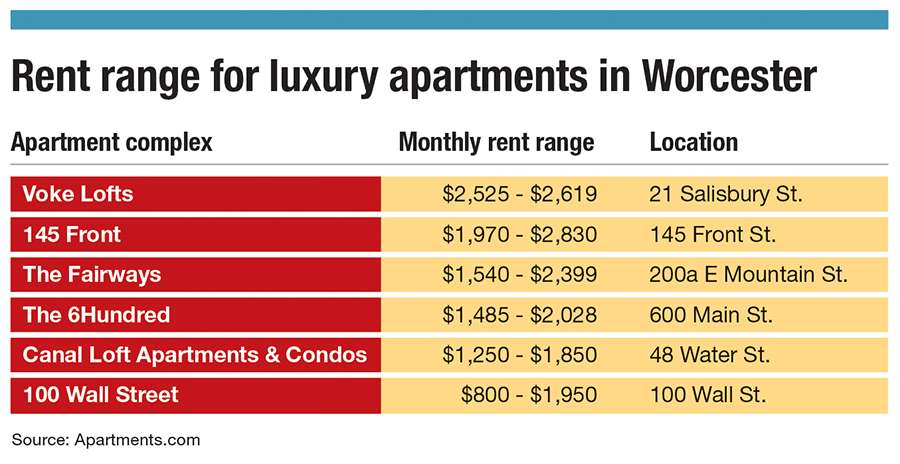
Worcester’s rental market is catering to a high-income tenant, which could be bad news for local workers
 Photo | Matt Wright
Worcester developer Michael Ermani
Photo | Matt Wright
Worcester developer Michael Ermani
Seemingly all of a sudden, a new word is being thrown around in the Worcester real estate market: luxury.
For long-term resident, the term seems ill-fitting for the historically downtrodden Woo. For developers, however, it’s the perfect buzzword to attract a new kind of tenant.

“The people who live and work in Worcester are now competing against people who work in Framingham, Natick, Marlborough, and Hudson,” said Realtor Brian Allen, who keeps close tabs on the city’s market with his firm WorcesterMulti. “That's the tenant that everybody wants. The more income, the more likely you are to get paid.”
New developer, new look
Allen sees the Worcester rental market in three main categories. On one end of the spectrum is government- and nonprofit-owned affordable housing, and on the other end is high-end complexes like 145 Front at City Square. The majority of units, which lie somewhere in between those two extremes, are smaller multifamilies and triple deckers.
While there has been an influx in larger complexes proposed and built in the last five or so years, those in-between multifamilies are where the most transformation has taken place, Allen said.
“You used to be able to just get a bad apartment from somebody who didn’t need the money,” he said, referring to the days when a significant portion of Worcester apartments were owner-occupied. “What you've done in Worcester is you've taken all the bad stuff that was on the bottom and instead of mixing it in and having some bad, all the bad stuff is gone.”
Out of 43 triple deckers Allen’s agency bought this year, five were owner-occupied.
The trend blossomed out of a rush on Worcester’s housing market from outside investors, mostly hailing from the increasingly unaffordable Boston area. The real estate market in the city has mirrored the rest of the nation during the coronavirus pandemic where demand for housing is outpacing supply, but in its own right has attracted investors who believe they can turn a profit remaking old housing stock or building new developments.
Now, Worcester has about half as many multifamilies on the market as is typical, said Allen.
This increase in sales provided new buyers the opportunity to renovate the units, which, in combination with heightened real estate prices, has prompted hiked-up rents.
“All of this stuff drives your investor into buying the worst house and making it look really pretty,” said Allen. “They're lipstick on a pig. They're better than the other Worcester apartments that they’re competing against. They're never going to be 145 Front.”

The new Worcester tenant
Developer and property manager Michael Ermani is working on his own luxury complex on Sunderland Road in Worcester.
His version of luxury is a necessity in the city’s increasingly competitive market.
“Tenants have become really, really picky. If you don’t have nice units, somebody else will,” Ermani said.
Ermani bought the 48-unit complex for $6.6 million after approaching the previous owner, and already has tenants lined up for the three units he has completed renovations on. His concept of luxury includes new flooring, stainless steel appliances, and granite countertops, which saves on maintenance in the long-run and attracts well-paying tenants.
“I have a lot of tenants that are from Boston,” said Ermani. “A lot of people work outside of Worcester, but it’s still more affordable, so they don’t mind the drive.”
As for the current residents, they will have the option to pay close to market-value rents if they choose to stay, he said.
Commuting time is becoming less of a factor for renters, as more people are working from home and only going into work once or twice a week.

“You can have an equally sophisticated and luxurious apartment in Worcester, and you can take the train once or twice a week to meet with your folks down in Boston, if need be, but you have the quality of life, the decreased cost of living, and all the cultural resources that Worcester has,” said Mark Rengel, vice president of development at the Menkiti Group.
The Menkiti Group is a real estate firm based in Washington, D.C. with considerable investments in Worcester. In December, the agency celebrated the opening of its 24-unit luxury and market-rate complex called Chatham Lofts in Worcester’s Theater District.
The vast majority of proposed and built luxury apartment complexes in the city are concentrated in downtown Worcester near I-290 and Route 9, providing quick access for people commuting east. According to the U.S. Census Bureau, the average Worcester resident commutes 25 minutes to work as of 2019.
“There’s room in Worcester for the residential housing market to become more sophisticated and to have a wide variety of products, including some luxury apartments that are a little more higher end,” Rengel said.
Problems for local workers
While landlords are catering toward tenants who work in Greater Boston, Worcester workers may be increasingly challenged to affordable housing in the city.
“The only affordable housing you see is the old timers that don’t do anything to the units and therefore charge accordingly. Everything else is trending towards luxury,” said Ermani.
The median individual income in Worcester is $26,671, according to the Census Bureau, significantly lower than Framingham’s $39,436 and Marlborough’s $38,578.
Allen fears Worcester could become a bedroom community for those working in MetroWest if the city doesn’t bring in a larger, higher-paying employer.
“People in Worcester who live and work … in this community, they’re getting priced out,” he said, adding they are being pushed into more affordable towns like Webster, Southbridge, and Spencer.
WBJ Web Partners
We need low income housing. I think this housing can be built so that it serves the purpose and is economical and reasonable, yet serves the needs of a community whose homes in this city are vital to our economy and social fabric. First, build small. Put a three bedroom on the footing of a 2 bedroom. 1 & 2 bedrooms & studios smaller, as well. Why? Construction costs are primary. Secondarily, these tend to be heavily subsidized and should serve as stepping stones to independently sourced units that the residents can strive for. As the tenants pursue the American dream of hard work and education, coupled with experience, training and perseverance, they will move out and up, creating an opening for someone new. These units should be safe and sound and quality-built. Next, the tenants must be means tested and scheduled inspections/interviews/paperwork should ensure valid need and trouble-free behavior on the part of the tenant. The management of these units must control the units so that all are treated fairly. For instance, sometimes public residential buildings stand the possibility of a type of anarchy. This to say that some will smoke on/in the premises. Some gatherings/loiterings threaten the management and pose a type of threat to the residents. A firm hand upholding the rules will lead to safer living and more equitable conditions for all. We are all familiar with public housing that has run wild. The tenants don't feel safe and the neighborhood regrets they moved in. This type of housing, well-run, will be a necessary addition to the fabric of our city. As for the size of the units inhibiting their usable space? You could add supervised areas, common rooms that would encourage community and social interaction. The city needs low-income housing. If built intelligently, we get more adequate units than we would have. If run well, everyone gets what they need. Job well done. Thoughts?








3 Comments